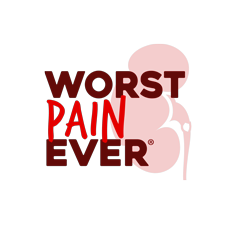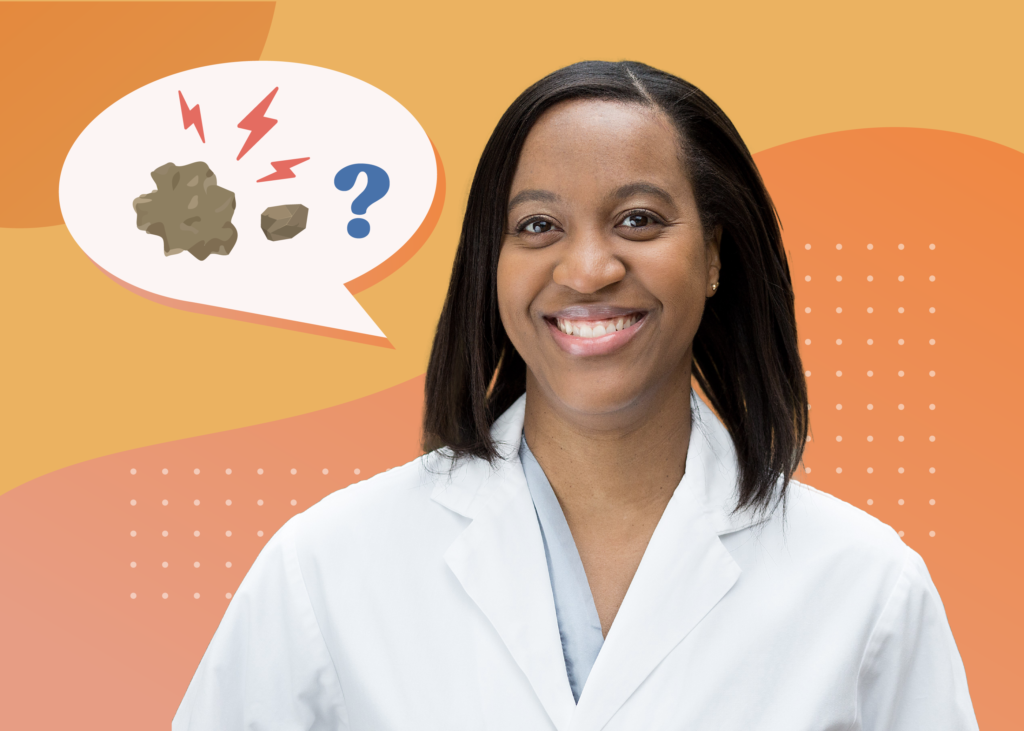From figuring out what stones you have, to making some big lifestyle changes, trying to manage your kidney stones can be tough! We sat down with Dr. Kymora Scotland, MD, PhD from UCLA Health, to learn everything we need to know about stones.
As a urologist, you’ve seen many patients who’ve had their own unique kidney stone journeys. What are some of the top few mistakes that kidney stone patients make?
Not drinking enough water. I think that it is tough to drink the amount of water that we’re asking you to drink and so people often give up too soon. My advice is to try to build yourself up to drinking 2.5 liters (85 oz) of water a day, by finding ways that work for you. Some people will set alarms for themselves so that they’re reminded every half hour to drink water, while others will have big jugs that have markings on them that state, “It’s 9 o’clock, drink some water.” I also tell people to make it fun, so if adding fruits or sparkling water helps you, then do that!
The second mistake I would say is giving up too soon on stone prevention. If you’ve been used to eating meat all your life, it’s tough to go down to one serving a day. Change your diet by gradually reducing your meat intake.
Also, if there are three different things that you’re trying to work on to help prevent stones, try doing one thing at a time instead. Perhaps this week you’re going to try to get into a groove of eating smaller portions. A couple of weeks later, you could look at your salt intake and make sure that you’re taking in less than the required amount. These small steps can help.
What about pediatric patients: how can parents help their children with kidney stones?
A lot more kids are forming kidney stones now which didn’t use to be the case. This could be due to genetic reasons or because of changes in diet. Many of the reasons for stones can be addressed through stone prevention practices. With kids who have stones, regardless of stone type, we tell them to drink lots of water, more than we would normally recommend for regular stone formers. Decreasing their salt and sugar is also helpful. A lot of the things we tell adults will work with kids who have recurrent stones as well.
We’ve noticed that kidney stone patients take numerous precautions to prevent future kidney stone recurrences. How effective are supplements and home remedies in kidney stone prevention?
There are lots of things online that are described as able to dissolve your stones. Some of them work, others less so, but they don’t seem to dissolve stones. What they might do is help pass the stone and may potentially help prevent future stones.
Uric acid stones are a type of kidney stone which can sometimes dissolve with medication. Whenever I have a patient who has a uric acid stone, I will offer them the option of taking medication so that they can stay out of the operating room. For everyone else, especially patients with calcium-based stones, there aren’t really medications that can help dissolve them. Generally speaking, if you’ve got a stone that’s not a uric acid stone, it’s probably not going to dissolve on its own. It may just end up needing to be treated.
How much of a role does diet play in forming kidney stones?
Diet plays a really large role in forming kidney stones and is one of the main three things you can do to help to prevent them. There are different types of stones and multiple reasons why people form stones. One of those reasons is genetics. That said, most people will be able to make dietary changes that might help prevent them from forming stones.
Diet changes include drinking about two to three litres of fluid in a day. I say fluid because a lot of patients can’t drink two litres of water. Instead, they drink tea, coffee and eat lots of fruits. Fruits have lots of water and I find that if you can’t drink all two litres of water, eating your water works too!
Depending on the type of stone that you form, there are changes you can make to your diet. People who form uric acid stones or who have high uric acid in their urine should monitor how much protein they’re taking in. This includes red meat, shellfish, poultry, and fish and meat products. Try having a fistful of meat at most, per meal.
For people with calcium-based stones or very high oxalate levels, monitor your oxalate levels. The top three things that really affect calcium stones are salt, sugar and water intake. It is important to have a diet that’s low in salt, sugar, especially refined sugars, and to drink lots of water.
Before we end off, if you could reach out to all the kidney stone warriors right now, what would your takeaway message be to them?
I’d like to say water, water, water, but I do think that water really is the number one thing. The second is the use of non-steroidal anti-inflammatory drugs (NSAIDs) when you have pain, as they can be helpful and don’t have the side effects of opioids. The third thing is to start with small changes. Stone prevention is hard and if you have multiple lifestyle changes to make, it becomes really challenging to make them all at once. Make them one at a time instead, so that you can gradually put them together.
Dr. Kymora Scotland is an endourologist practitioner and an Assistant Professor of Urology in UCLA. She also holds the role as Director of Endourology Research and Associate Director of Endourology Fellowship Program.
Dr. Kymora is passionate about her patients and works with them to treat kidney stones and other surgical issues through minimally invasive surgery. She is also a researcher and her clinical expertise are in the treatment of kidney stones and benign prostatic hyperplasia management.





